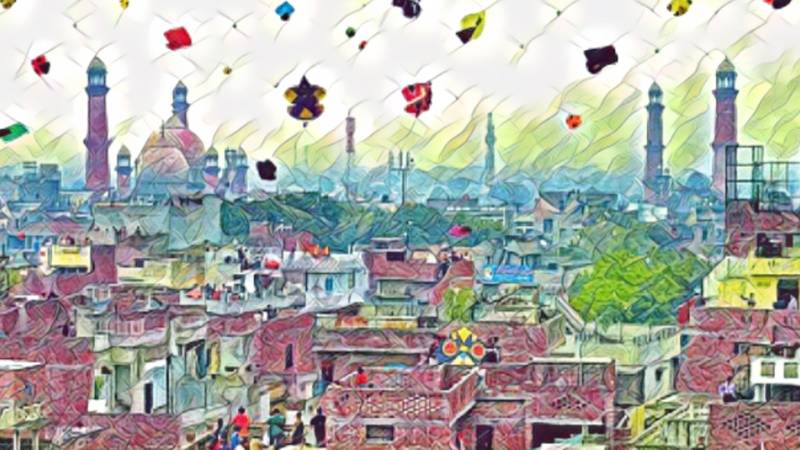
Every year, the Basant festival was commemorated in February, as the winter chill relinquished its hold to welcome the onset of summer. Crowds would flock to Lahore's kite markets to procure their beloved, vibrant kites of various shapes and spools of differing qualities, marking this two-day celebration. Families, relatives, and friends would converge from distant cities to partake in this splendid carnival.
As night descended, BBQ parties, music, and jubilant shouts reverberated through the air, accompanied by special slogans like 'bo ka ta' or 'naya ura' (fly new kite), resonating deeply with the revellers. Roofs were meticulously cleaned and bedecked to illuminate the sky, where countless kites would dance and twirl conspicuously, casting a mesmerising display across the heavens, a spectacle observed only once a year.
The following day, at noon, oranges took precedence, enhancing the festive ambiance. I have never witnessed such a multitude of people gathered on rooftops, brimming with joy and excitement. It was truly a spectacle worth beholding. I have experienced it firsthand.
Historically, Basant Panchami, also referred to as 'Vasanth Panchami' and 'Shri Panchami', holds significant importance as an ancient Hindu festival. In the 19th century, Maharaja Ranjit Singh, the founder of the Sikh Empire and a staunch advocate of this tradition, annually observed the festival in February to herald the arrival of spring. Symbolising rejuvenation, optimism, and happiness, Singh and his consort Moran would attire themselves in yellow and colourful garments, engaging in kite-flying festivities.
Over time, this celebration transcended boundaries, capturing the interest of people across Pakistan. Initially rooted in Amritsar, Kasur and Lahore, Basant gradually gained momentum in other nations such as the UAE, Saudi Arabia, Germany and India, among others - sadly excluding Pakistan. However, due to escalating injuries caused by stray kite strings, the Supreme Court of Pakistan intervened in 2005, imposing a ban on the festivity.
It has been nearly two decades since the Punjab government imposed a blanket ban on this age-old tradition to deal with the hazards posed by the lethal strings. To draw an analogy, when confronted with a splitting headache, one does not opt for decapitation but rather seeks medicinal relief. Similarly, addressing the issue lies in regulating the strings rather than abolishing the entire festival.
Two primary reasons underlie the suppression of this festival. Firstly, the utilisation of glass-coated strings to sharpen them for kite battles poses a significant threat, particularly to motorcyclists on roads. Secondly, the state capitulated to pressure from narrow-minded clerics, forsaking this secular, colourful tradition. While Basant thrives in other parts of the country despite restrictions, its absence in Lahore remains a perplexing enigma.
Every year, the police crackdown on kite flyers and vendors, showcasing their efforts on social media. However, one cannot help but question their whereabouts during the festivity's preparations. The answer to this question is glaringly apparent.
The state should not prohibit the tradition of kite flying due to the objections of a few individuals, as it draws tourists from around the globe and generates revenue in the form of dollars for a country in need of foreign exchange. Despite years of attempting to attract tourists and investors from abroad, the government's efforts have been largely futile. This festival, however, presents an opportunity for the government to capitalise on, showcasing Pakistan's true essence – its cuisine, rich history, culture, and hospitality – on a global scale to entice visitors.
In times of unprecedented crisis where finding moments of joy has become a luxury, the state must lift the ban and allow people to revel in the festival for just two days each year, within the guidelines set by the authorities. It is not an unreasonable request. Aerial firing during celebratory occasions such as Basant, New Year's Eve, weddings and Independence Day must be strictly prohibited, with severe penalties imposed on offenders.
Basant is not merely a festival to be enjoyed; it served as the livelihood for thousands whose jobs and families depend on this profession. With unemployment levels at record highs, the state should not further deprive these individuals of their means of earning.
Now, let us consider the challenges of celebrating Basant safely. I propose several practical solutions. Firstly, declare a two-day official holiday nationwide. Additionally, restrict bike riding on major thoroughfares and encourage people to avoid venturing out with their families and children on bikes. Thirdly, bolster the responsiveness of the 1122 helpline service to swiftly address any unfortunate incidents. Lastly, learn from and replicate the safety measures implemented by other countries to observe this festival.
Only then can we safely embrace Basant in Pakistan once more. Let the sky be adorned with kites once again. Let the shouts and slogans of Basant reverberate in the open spaces of Pakistan. Let us provide millions of people with a reason to come together, smile, and engage in friendly competitions after two decades. Let the populace showcase their resilience and turn their pent-up frustrations into joy, reaffirming their vitality as a nation.
I implore the esteemed first-ever elected female Chief Minister of Punjab, the bureaucracy, and the authorities to reconsider their decision and lift the ban on Basant, allowing people to enjoy the festivities while adhering to precautionary measures, thus transforming this once-lost festival into a mutually beneficial pursuit for all.

